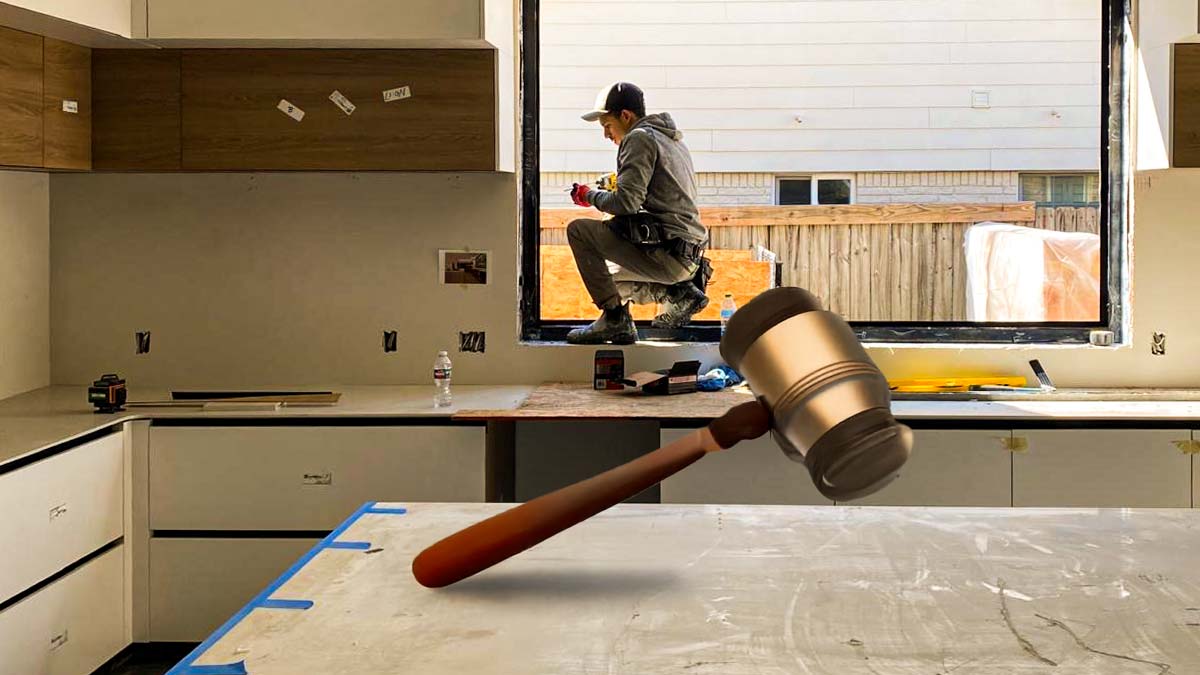
By Joe G., Owner of Houston Builders
As a long-time Houston builder and remodeling professional, I’ve guided countless clients through the sometimes confusing world of construction permits. Whether planning a simple renovation in Spring Branch or breaking ground on a new commercial development in the Energy Corridor, understanding Houston’s permit requirements is crucial to your project’s success.
Why Permits Matter in Houston’s Construction Landscape
Houston’s unique approach to development—operating without comprehensive zoning but with robust building codes—makes permit navigation particularly important. In my 20+ years leading Houston Builders, I’ve watched the city evolve its permit requirements to maintain safety while accommodating rapid growth.
“The most expensive permit is the one you didn’t get. Trust me, I’ve seen the consequences of proceeding without proper documentation—it always costs more in the end, both in time and money.” – Joe G.
In 2024, Houston adopted updated construction codes, making this guide especially relevant for anyone considering a building project. As a provider of comprehensive remodeling services throughout the Greater Houston area, I can tell you that staying current on permit requirements is non-negotiable for successful projects.
Houston’s 2024 Construction Code Updates: What You Need to Know
Recent Code Modernization
On January 1, 2024, Houston implemented significant updates to its construction codes. This modernization included adopting:
- 2021 International Building Code (with Houston Amendments)
- 2021 International Residential Code (with Houston Amendments)
- 2021 International Fire Code (with Houston Amendments)
- 2021 International Existing Building Code (with Houston Amendments)
- 2021 Uniform Mechanical Code (with Houston Amendments)
- 2021 Uniform Plumbing Code (with Houston Amendments)
- 2021 Swimming Pool and Spa Code (with Houston Amendments)
- 2023 National Electrical Code (State Mandated)
- 2021 International Energy Conservation Code (with Houston Amendments)
These updates have significant implications for construction and remodeling services in Houston, particularly for energy efficiency requirements, safety standards, and building techniques.
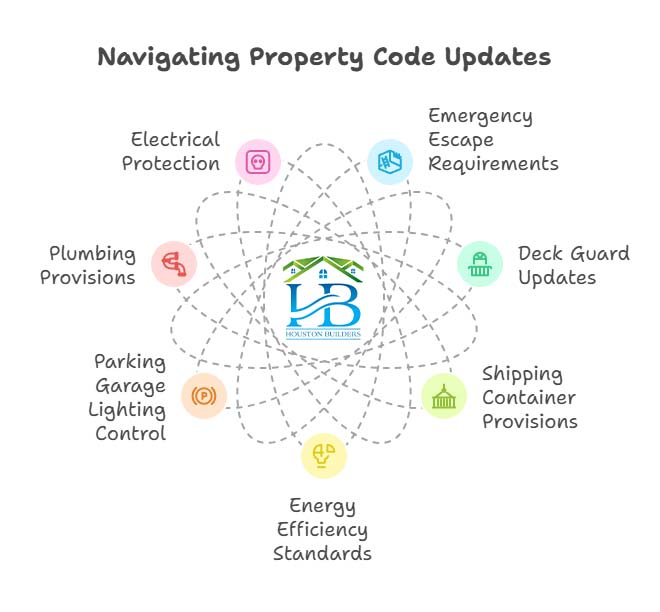
Navigating Property Code Updates Infographics
Key Changes Affecting Property Owners
Some notable changes that might affect your project include:
- New requirements for emergency escape and rescue openings
- Updates to exterior deck guard requirements
- New provisions for using shipping containers as buildings
- Enhanced energy efficiency standards for homes (average 8.9% energy savings)
- New requirements for parking garage lighting control
- Updates to plumbing provisions for leak detection and backflow prevention
- Expanded GFCI and AFCI protection requirements for electrical systems
If you’re planning a project in neighborhoods like The Heights (77008), River Oaks (77019), or Montrose (77006), it’s essential to work with an experienced contractor who understands these code updates.
When Do You Need a Permit in Houston?
Residential Projects Requiring Permits
Most homeowners are surprised by how many projects legally require permits. Here’s a basic rundown:
| Project Type | Permit Required? | Notes |
|---|---|---|
| Bathroom remodel | Yes | If changing plumbing/electrical |
| Kitchen remodel | Yes | If changing plumbing/electrical |
| Room addition | Yes | Always required |
| Garage conversion | Yes | Always required |
| Deck/patio (over 30″ height) | Yes | Safety regulations apply |
| Fence (over 8′ tall) | Yes | Height restrictions vary by area |
| Window replacement | Sometimes | Required if changing size/location |
| Roof replacement | Yes | Required for structural changes |
| Interior non-structural changes | Sometimes | Depends on scope |
| Plumbing changes | Yes | Always required |
| Electrical changes | Yes | Always required |
| HVAC replacement | Yes | Always required |
| Driveway expansion | Yes | City right-of-way concerns |
| Demolition | Yes | Always required |
When providing remodeling services in areas like Katy (77494), Memorial (77024), or Clear Lake (77062), we always start with a permit check to ensure compliance.
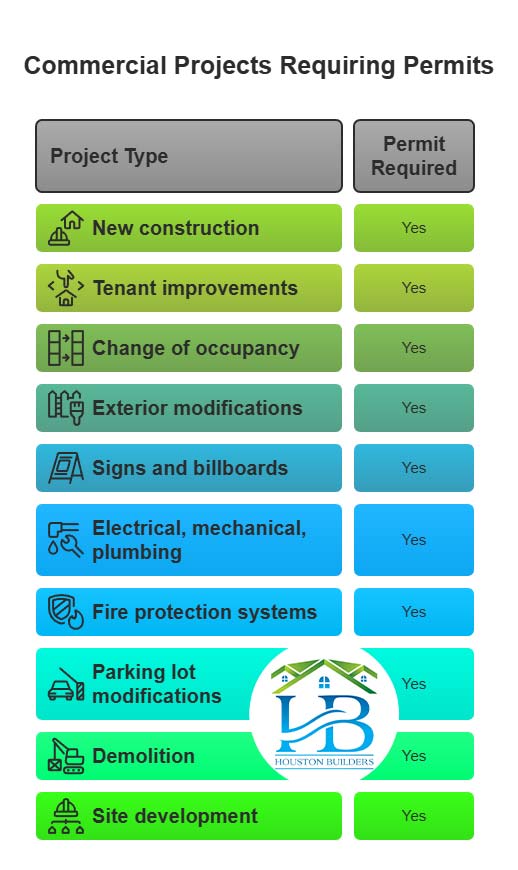
Commercial Projects Permits Infographics
Commercial Projects Requiring Permits
Commercial projects almost always require permits, including:
- New construction
- Tenant improvements
- Change of occupancy
- Exterior modifications
- Signs and billboards
- Electrical, mechanical, or plumbing work
- Fire protection systems
- Parking lot modifications
- Demolition
- Site development
Due to high-density development patterns, permit requirements can be particularly complex for businesses in the Galleria area (77056), Downtown Houston (77002), or the Energy Corridor (77079).
Exemptions from Building Permits
Some projects don’t require building permits, including:
- Painting, papering, tiling, carpeting, and similar finish work
- Temporary motion picture/theater sets
- Window awnings supported by exterior walls (in some residential settings)
- Movable fixtures, cases, and counters under 5’9″ height
- Sidewalk and driveway repairs (if not in the city right-of-way)
- Minor plumbing repairs like fixing leaks or replacing fixtures (without changing pipes)
However, I always recommend checking with the Houston Permitting Center before assuming exemption. Our remodeling services team can also help determine if your project needs permits.

It’s Important To Read the Complete Construction Guide
The Houston Permitting Process: Step-by-Step
1. Plan Development and Pre-Application Consultation
Before submitting anything, develop detailed plans and consider a pre-application consultation, especially for complex projects. This consultation can save significant time for residential projects in areas like Spring Branch (77055) or The Woodlands (77381).
2. Submit Application and Plans
You’ll need to submit:
- Completed application forms
- Construction documents/plans
- Site plan showing property boundaries and structure locations
- Structural calculations (if applicable)
- Energy compliance documentation
- Other supporting documents as required
Applications can be submitted online through the Houston Permitting Center’s portal or in person at 1002 Washington Avenue.
3. Plan Review
The city will review your application for compliance with:
- Building codes
- Floodplain regulations
- Fire safety requirements
- Structural integrity
- Energy code compliance
- Health department requirements (if applicable)
The review timeline varies based on project complexity and current department workload. For typical remodeling services projects, expect:
- Simple residential: 5-10 business days
- Complex residential: 2-4 weeks
- Commercial: 4-8 weeks
4. Revisions (If Required)
You must revise and resubmit if your plans don’t meet code requirements. This is where working with experienced professionals can save time—at Houston Builders, our pre-submission review catches most issues before they become problems.
5. Permit Issuance
Once approved, you’ll pay permit fees and receive your permit. These must be displayed on the job site throughout construction.
6. Inspections
Construction requires inspections at key stages:
- Foundation inspection
- Framing inspection
- Mechanical, electrical, plumbing (MEP) inspections
- Insulation inspection
- Final inspection
Failing to schedule required inspections can result in penalties and potentially having to remove completed work to allow for proper inspection.
7. Certificate of Occupancy or Compliance
A Certificate of Occupancy is required before the space can be legally occupied for new construction and commercial renovation. A Certificate of Compliance may be issued upon final inspection approval for smaller residential projects.
Understanding Houston’s Permit Fee Structure
Residential Permit Fees
Houston uses a tiered Fee structure based on project type, size, and valuation. As of 2025, fees include:
- Administrative Fee: $33.10
- Minimum Fee for most Building Code Enforcement permits: $89.81
- Minimum Fee for plumbing permits: $96.22
Residential permit fees are typically calculated based on square footage. The city offers discounts for affordable housing:
- 50% discount on permit fees for homes 1,800 square feet or less
- This provides approximately $543 in savings per residential permit
During the consultation phase, we provide detailed Fee estimates for our clients’ remodeling services in areas like Sugar Land (77479) or Pearland (77584).
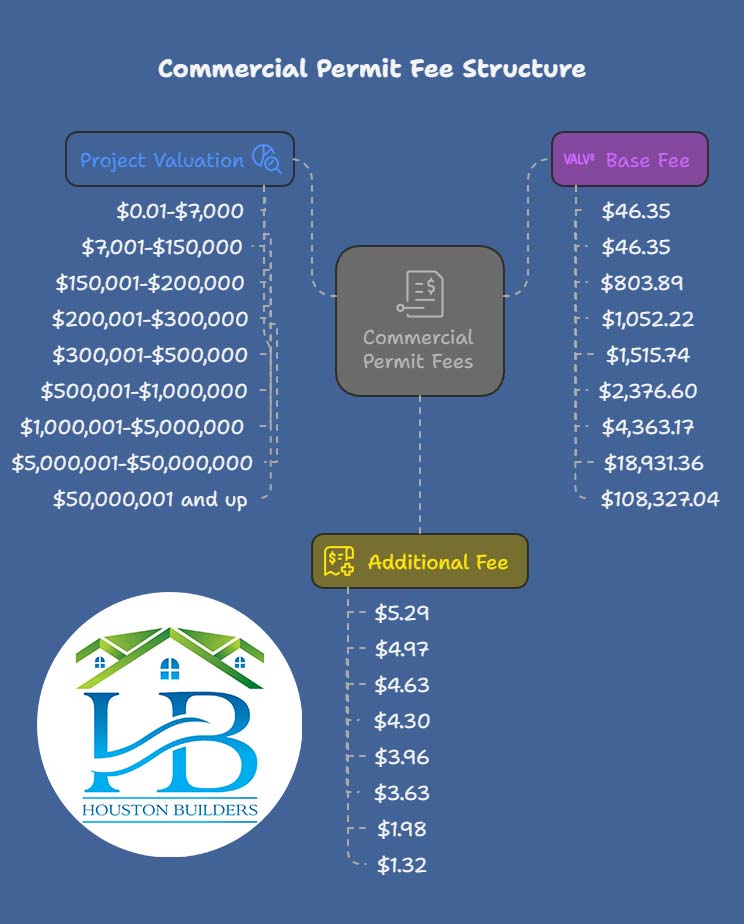
Fees per Square Fees
Commercial Permit Fees
Commercial permits use a valuation-based calculation that scales with project cost:
- $0.01-$7,000: $46.35
- $7,001-$150,000: $46.35 for the first $7,000 plus $5.29 for every additional $1,000
- $150,001-$200,000: $803.89 for the first $150,000 plus $4.97 for every additional $1,000
- $200,001-$300,000: $1,052.22 for the first $200,000 plus $4.63 for every additional $1,000
- $300,001-$500,000: $1,515.74 for the first $300,000 plus $4.30 for every additional $1,000
- $500,001-$1,000,000: $2,376.60 for the first $500,000 plus $3.96 for every additional $1,000
- $1,000,001-$5,000,000: $4,363.17 for first $1,000,000 plus $3.63 for every additional $1,000
- $5,000,001-$50,000,000: $18,931.36 for first $5,000,000 plus $1.98 for every additional $1,000
- $50,000,001 and up: $108,327.04 for first $50,000,000 plus $1.32 for every additional $1,000
Additional fees may apply for specialized permits, reinspections, or expedited reviews.
Special Permit Considerations in the Houston Area
Flood-Prone Areas
Houston’s flood history has led to stricter building requirements in flood-prone areas. If your property is in or near a floodplain in areas like Meyerland (77096) or Kingwood (77339), you’ll need to:
- Submit elevation certificates
- Possibly elevate new construction or substantial improvements
- Implement specific flood mitigation measures
- Comply with Chapter 19 of the City Code for floodplain management
These additional requirements often add complexity and cost to new construction and remodeling services projects.
Historic Districts
If your property is in one of Houston’s historic districts, additional permits and approvals are required:
- Certificate of Appropriateness from the Houston Archaeological and Historical Commission
- Compliance with landmark district design guidelines
- Possible public hearings for significant changes
This affects properties in areas like The Heights (77008), Old Sixth Ward (77007), or the Houston Heights East, West, or South historic districts.
Airport Zones
Properties near Houston’s airports (Bush Intercontinental, Hobby, or Ellington) may have:
- Height restrictions
- Noise attenuation requirements
- Special permitting needs
This is particularly relevant in areas like Humble (77338) near Bush Intercontinental or Clear Lake (77062) near Ellington.
Common Permitting Mistakes to Avoid
After decades in the construction industry, I’ve seen countless permitting mistakes. Here are the most common ones:
1. Starting Work Without Proper Permits
This is the most frequent and costly mistake. Working without permits can result in:
- Stop work orders
- Penalty fees (often doubled permit costs)
- Demolition of completed work
- Difficulty selling the property later
In extreme cases, unpermitted work leads to insurance denials when problems occur later.
2. Incorrect Valuation on Permit Applications
Undervaluing a project to save on permit fees can backfire. The city may:
- Reject the application
- Reassess the valuation
- Impose penalties
- Delay your project
Always provide an honest valuation based on realistic construction costs.
3. Inadequate or Incomplete Plans
Plans that lack sufficient detail will be rejected, causing delays. For our remodeling services clients, we ensure plans include:
- Complete dimensions
- Material specifications
- Structural details
- Mechanical, electrical, and plumbing plans
- Energy code compliance documentation
4. Missing Required Inspections
Each permit requires specific inspections at various stages. Missing these can result in:
- Having to remove completed work for inspection
- Penalty fees
- Project delays
- Potential legal issues when selling
5. Not Understanding Code Requirements
Projects often face revisions and delays without a thorough understanding of building codes. This is why working with experienced contractors who provide comprehensive remodeling services is invaluable.
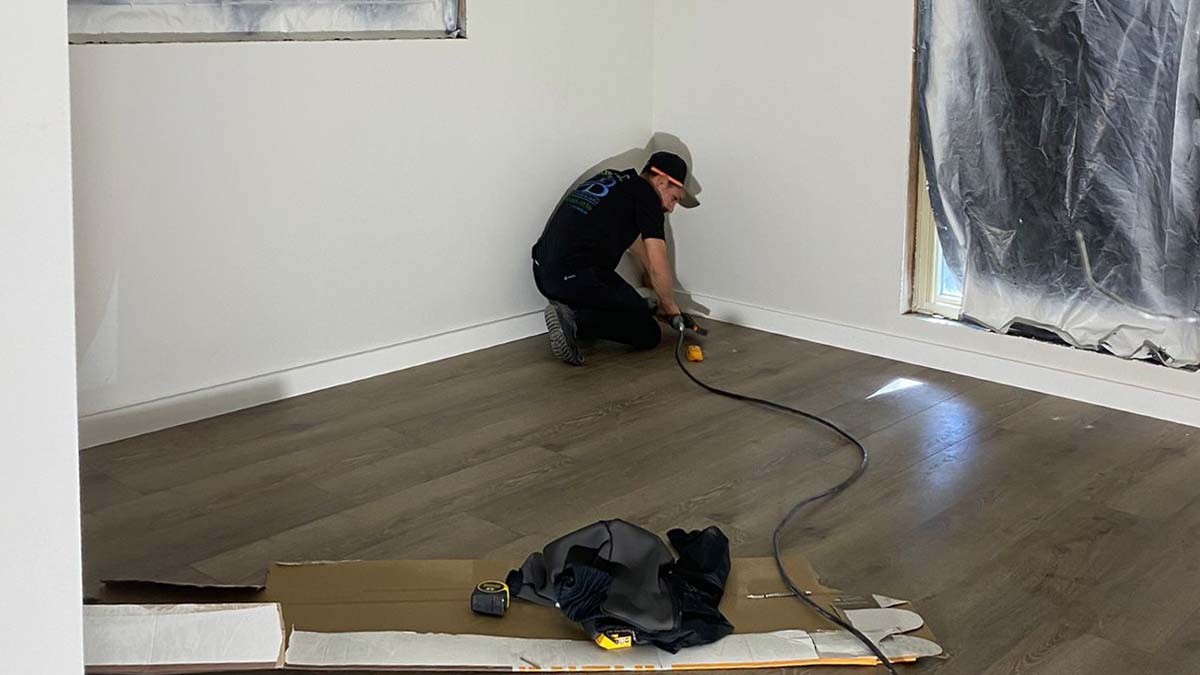
Professional Contractor Near Me
Working with a Contractor vs. Pulling Permits Yourself
When to DIY Permits
Property owners can legally pull their permits for many projects. This might make sense if:
- You’re working on your primary residence
- You understand construction requirements
- You have time to navigate the process
- The project is relatively simple
- You’ll be personally supervising all work
When to Work with a Professional
For most significant projects, having a professional handle permitting is advisable, especially when:
- The project is complex or large-scale
- You’re unfamiliar with building codes
- Time is a primary consideration
- Multiple trades are involved
- The property is in a specialty zone (historic, flood plain, etc.)
At Houston Builders, our remodeling services include comprehensive permit management. For clients in Cypress (77433), Bellaire (77401), or Friendswood (77546), this often saves weeks of frustration and prevents costly mistakes.
The Cost of Non-Compliance: Why Permits Aren’t Optional
Working without required permits might seem tempting to save time or money, but the consequences can be severe:
Financial Consequences
- Double or triple permit fees when caught
- Fines of up to $500 per day for each violation in some cases
- Costs to remove and reconstruct non-compliant work
- Reduced property value
- Potential denial of insurance claims
Legal Consequences
- Stop work orders
- Liens against the property
- Difficulty selling the property
- Liability for non-compliant work
- Potential legal action from subsequent property owners
Safety Consequences
Most importantly, permit requirements exist for safety reasons. Unpermitted work may:
- Create fire hazards
- Compromise structural integrity
- Result in dangerous electrical or plumbing installations
- Void equipment warranties
- Create health risks due to improper ventilation or materials
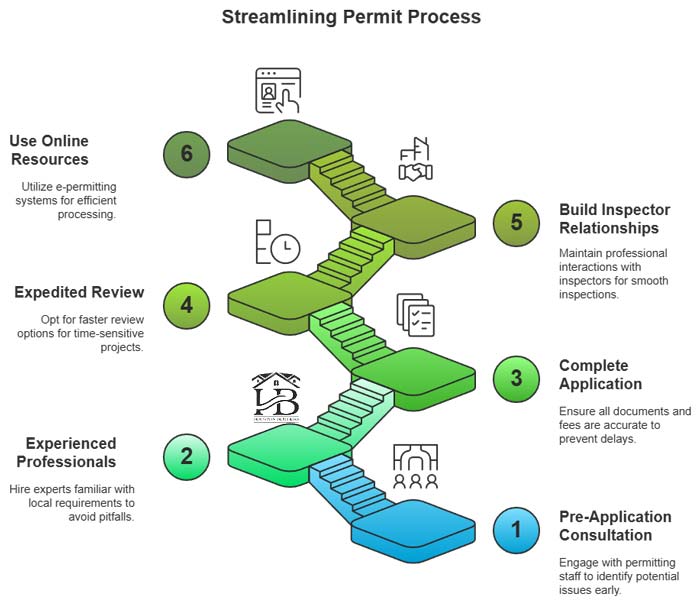
The Process of getting a permit in Houston
Expediting the Permit Process: Tips from a Pro
After years of providing remodeling services throughout Houston, I’ve developed strategies to make the permitting process smoother:
1. Pre-Application Consultation
For complex projects, schedule a pre-application meeting with the permitting staff. They can identify potential issues before you submit formal plans.
2. Use Experienced Professionals
Work with architects, engineers, and contractors who have experience with Houston’s specific requirements. Their knowledge can prevent common pitfalls.
3. Submit Complete, Detailed Applications
Ensure your application includes all required documentation, detailed plans, and correct Fee calculations. Incomplete applications are the most common reason for delays.
4. Consider Expedited Review
For time-sensitive projects, Houston offers expedited review options for additional fees. This can reduce review time by 50% or more.
5. Build Relationships with Inspectors
Professional, respectful interactions with inspectors go a long way. When providing remodeling services, we ensure our job sites are clean, organized, and ready for inspection, which helps maintain positive relationships.
6. Use Online Resources
Houston’s e-permitting system allows for online applications, Fee payments, and inspection scheduling, which can significantly reduce processing time.
Resources for Houston Property Owners
For those navigating the permit process, these resources can be invaluable:
Houston Permitting Center
Location: 1002 Washington Avenue, Houston, TX 77002 Website: www.houstonpermittingcenter.org Phone: 832-394-9000
The central hub for all permitting activities in Houston. They offer:
- In-person consultation
- Online permit applications
- Fee calculators
- Code information
Houston Public Works
Website: www.publicworks.houstontx.gov Phone: 832-395-2500
Provides information on infrastructure requirements, right-of-way permits, and drainage regulations.
Houston Planning & Development Department
Website: www.planning.houstontx.gov Phone: 832-393-6600
Offers guidance on development regulations, historic preservation, and platting requirements.
Houston Fire Department
Website: www.houstontx.gov/fire Phone: 832-394-6700
Provides information on fire code requirements and fire protection system permits.
Frequently Asked Questions About Houston Construction Permits
Over the years, providing construction and remodeling services throughout Houston, I’ve heard many of the same questions from clients. Here are answers to the 20 most common questions about Houston’s construction permit process:
General Permit Questions
1. How long does getting a permit in Houston typically take?
Timeframes vary significantly based on project complexity and current department workload. For simple residential projects, expect 5-10 business days. More complex residential projects may take 2-4 weeks, while commercial projects typically take 4-8 weeks. These timelines may extend further during peak construction seasons (spring and summer).
2. Can I start work before my permit is approved?
No. Starting construction before permit approval is against city regulations and can result in stop work orders, penalties, and potentially having to remove completed work. The only exception is emergency repairs to prevent immediate danger to life or property.
3. How long is my permit valid once issued?
Houston construction permits are valid for 180 days from issuance or the last approved inspection. They become inactive if work hasn’t commenced within 180 days or is suspended for 180 days. If work hasn’t been completed, permits expire after two years.
4. What should I do if my project changes after issuing the permit?
You must submit revised plans showing the changes and obtain approval before proceeding with the modified work. Minor changes may be approved quickly, while significant changes may require a complete review.
5. Do I need a permit for emergency repairs?
Emergency repairs to prevent immediate danger can be performed without prior permitting, but you must apply for a permit on the next business day. Document the emergency conditions with photos before making repairs.
Residential Project Questions
6. Do I need a permit to replace my roof in Houston?
Yes, replacing a roof requires a permit in Houston. The permit ensures the new roof meets current code requirements for wind resistance, which is essential in our hurricane-prone region. Properties in areas like Memorial (77024) or Clear Lake (77062) may have specific requirements based on proximity to flood zones.
7. Do I need a permit for a kitchen or bathroom remodel?
Yes, most kitchen and bathroom remodels require permits, especially if you’re changing plumbing or electrical, or removing/adding walls. Even simple updates like moving a sink or adding outlets require proper permitting.
8. Can I build a detached garage or shed without a permit?
Structures over 200 square feet require a permit. Even smaller structures may require permits depending on their use, location on the property, and utility connections. Neighborhood structures like River Oaks (77019) or The Woodlands (77381) may also be subject to HOA restrictions beyond city requirements.
9. Do I need a permit to replace my windows?
If you’re replacing windows with the same size and type in the exact location, you typically don’t need a permit. However, a permit is required to change the size, location, or kind (especially in load-bearing walls). Historical districts like The Heights (77008) have additional requirements.
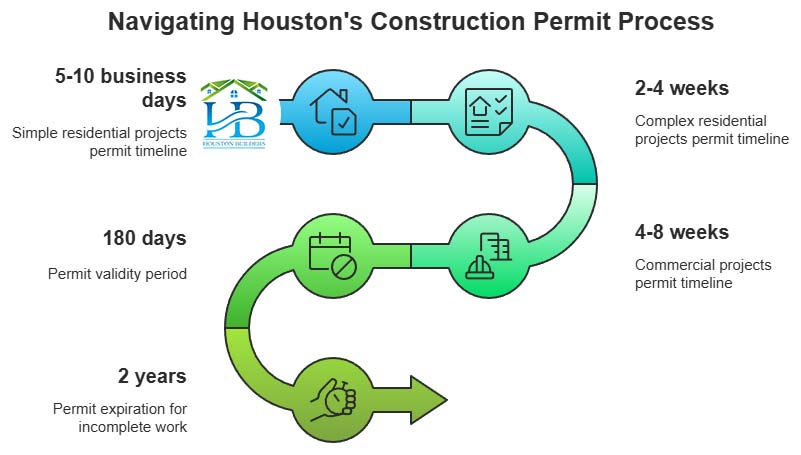
Infographics of Houston’s Construction Permit Process
10. Do I need a permit to replace my HVAC system?
Yes, replacing HVAC equipment requires a mechanical permit. This ensures the system is appropriately sized and installed and meets current energy efficiency requirements. Improper HVAC installation is one of the most common issues we address in our remodeling services.
Commercial Project Questions
11. Do I need a permit for interior commercial renovations?
Yes, most commercial interior renovations require permits, even if they’re primarily cosmetic. This includes tenant improvements, changes to electrical or plumbing systems, and modifications affecting egress paths or occupancy capacities.
12. What’s involved in getting a Certificate of Occupancy?
A Certificate of Occupancy (CO) requires passing final inspections for all building systems, compliance with fire safety requirements, and sometimes health department approval. For commercial spaces in areas like the Galleria (77056) or Downtown (77002), additional accessibility inspections may be required.
13. Do I need special permits for restaurant construction?
Yes, restaurants require additional permits beyond standard construction permits, including health department approvals, grease trap permits, and often specific ventilation requirements. Working with contractors experienced in restaurant construction is essential.
14. How do I handle permitting a change of use in a commercial building?
Change of use permits require demonstrating that the new use complies with current building codes, which may necessitate upgrades to fire protection systems, accessibility features, parking, and utility services. This is particularly important in mixed-use neighborhoods like Montrose (77006) or EaDo (77003).
15. Are there expedited options for commercial permits?
Yes, Houston offers expedited review services for commercial projects for an additional Fee. This can significantly reduce permitting timelines for time-sensitive projects in business districts like the Energy Corridor (77079).
Technical and Process Questions
16. Who can pull permits in Houston?
Property owners can obtain permits for work on their primary residence. Licensed contractors or authorized agents must obtain licenses for other properties. We handle all permitting as part of our comprehensive service package when we provide remodeling services.
17. What inspections will I need during my project?
Typical inspections include foundation, framing, mechanical/electrical/plumbing rough-in, insulation, and final inspections. Commercial projects and specific residential work may require additional specialized inspections.
18. What happens if I fail an inspection?
If you fail an inspection, the inspector will provide a list of corrections needed. Once these are addressed, you must schedule a reinspection (which may incur additional fees). Multiple failed inspections can significantly delay your project timeline.
19. How do I know if my property is in a flood zone, and how does that affect permitting?
You can check your property’s flood zone status using FEMA’s flood map service or the Harris County Flood Control District website. Properties in flood zones, especially in areas like Meyerland (77096) or Kingwood (77339), have additional permitting requirements, including elevation certificates and compliance with Chapter 19 of the City Code.
20. What are the consequences of not getting the required permits?
Unpermitted work can result in stop work orders, penalty fees (often double the original permit cost), required demolition of completed work, difficulty selling the property, insurance claim denials, and potential legal liability. I’ve seen homes in Bellaire (77401) and West University (77005) face significant challenges during resale due to unpermitted additions or renovations.
Texas Construction Penalties and Fees: What Houston Builders Need to Know
Understanding the Cost of Non-Compliance
As the owner of Houston Builders offering Remodeling Services throughout Houston’s diverse ZIP codes, including 77002, 77005, 77024, 77056, and 77027, I’ve learned that understanding construction penalties and fees isn’t just good business—it’s essential for survival in our industry. The financial consequences of code violations can quickly erode profit margins and damage your reputation.
“In construction, knowing the penalties is as important as knowing the codes themselves. One mistake can cost thousands in fines and weeks of project delays.” – Joe, Houston Builders
State-Level Regulatory Penalties in Texas
Texas Department of Licensing and Regulation (TDLR) Sanctions
When providing Remodeling Services across Houston neighborhoods, we must know the TDLR’s strict penalty structure, particularly for specialized projects.
Industrialized Housing and Buildings (IHB) Penalties
The TDLR enforces penalties for violations related to industrialized housing under Texas Occupations Code, Chapter 1202:
| Violation Class | First Offense | Second Offense | Third Offense |
|---|---|---|---|
| Class A | Reprimand to $1,000 | $500 to $2,000 | $1,000 to $4,000 per day and/or suspension |
These violations include failing to notify the Department of name changes, address changes, ownership changes, or module transfers within required timeframes—paperwork issues that can easily arise during busy periods when providing Remodeling Services in areas like West University (77005) or Memorial (77024).
Architectural Barriers Violations
For projects requiring accessibility compliance, particularly in commercial Remodeling Services in Downtown Houston (77002):
| Violation Class | First Offense | Second Offense | Third Offense |
|---|---|---|---|
| Class A | $500 to $3,000 | $1,500 to $4,000 | $2,500 to $5,000 |
These violations include failure to pay inspection fees, submit plans, have projects inspected, or comply with Texas Accessibility Standards—critical considerations for commercial renovations in the Galleria area (77056).
Elevator and Escalator Violations
Building owners face penalties for elevator and escalator violations under the Texas Health & Safety Code, Chapter 754:
| Violation Class | First Offense | Second Offense | Third Offense |
|---|---|---|---|
| Class A (per unit) | Up to $1,000 | $500 to $2,000 | $1,000 to $3,000 |
Unlicensed Contractor Penalties
When offering Remodeling Services in upscale areas like Highland Village (77027), proper licensing is crucial:
- Courts can impose fines up to $5,000 as an alternative to jail or in addition to imprisonment
- Consumers may recover money paid to unlicensed contractors
- Clients may be relieved of contractual payment obligations
Municipal Code Enforcement Penalties in Houston
Civil Penalties for Building Code Violations
When providing Remodeling Services throughout Houston, the municipal penalties can vary significantly:
- Up to $1,000 per day per violation for standard properties
- Limited to $10 per day per violation if the property is the owner’s lawful homestead
These penalties apply to violations such as:
- Failure to repair, remove, or demolish structures deemed dangerous
- Failure to comply with municipal orders regarding substandard buildings
- Violations of minimum standards for buildings
Municipal Fines for Code Violations
Different Texas municipalities establish their penalty schedules:
- Texas City: Fines range from $10 to $2,000 upon conviction, with each day of non-compliance constituting a separate offense
- Fort Worth: Civil penalties up to $1,000 per day per violation (standard properties) or $10 per day per violation (homestead properties)
Construction Zone Violations
When our Remodeling Services require work zones that affect traffic, these enhanced penalties apply:
- Speeding fines are doubled in work zones
- Fines can reach $1,000 if construction workers are present
- Fines for tailgating in construction zones amount to $200
- Speeding that contributes to an accident in a work zone can result in fines exceeding $2,000
Building Permit and Inspection Fees
Plan Review and Inspection Fees
When budgeting for Remodeling Services, we account for the TDLR’s Fee structure for plan reviews and inspections:
| Construction Cost | Plan Review Fee | Inspection Fee |
|---|---|---|
| Up to $1 million | $400 | $400 |
| $1 million to $5 million | $600 | $600 |
| $5 million to $10 million | $800 | $800 |
Municipal Building Permit Fees
Texas City Building Permit Fees:
| Construction Value | Fee Structure |
|---|---|
| $0-$1,000 | $15.00 |
| $1,001-$50,000 | $15.00 for the first $1,000 plus $5.00 for each additional thousand |
| $50,001-$100,000 | $260.00 for the first $50,000 plus $4.00 for each additional thousand |
Town of Fairview Fees:
- Plan review: $75.00
- Minimum Fee: $100.00
- 150′ and over: +$0.65/sq. Ft.
- Additional fees for concrete pads, electricity, running water, etc.
Important Legislative Note for Residential Projects
House Bill 852 (effective May 21, 2019) prohibits municipalities from determining building permit or inspection fees based on the value or cost of residential construction. This directly impacts how we quote Remodeling Services to clients in neighborhoods like West University (77005) or Memorial (77024).
Reinspection and Special Fees
Many municipalities charge additional fees that affect our Remodeling Services:
- Town of Fairview: $50.00 for the first reinspection, increasing by $25.00 increments for each subsequent reinspection
- TDLR Special Inspections: $40/hour plus travel time for inspections not covered by other fees
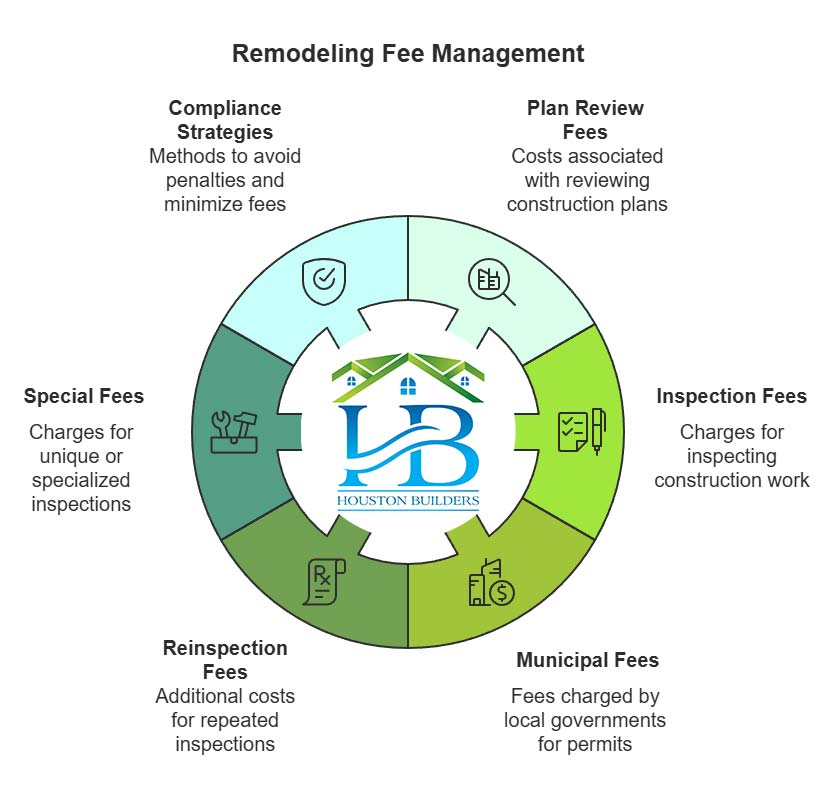
Remodeling Fee Graph
Strategies to Avoid Penalties and Minimize Fees
Proactive Compliance Approach
When providing Remodeling Services, we implement these strategies to avoid costly penalties:
- Regular Code Training: Our team stays updated on all Houston and Texas code requirements
- Thorough Pre-Project Assessment: We identify potential code issues before beginning work
- Detailed Documentation: We maintain comprehensive records of all permits, inspections, and communications
- Established Relationships: We maintain good working relationships with local building officials
- Quality Control Checks: We conduct internal inspections before official inspections
Conclusion: The Value of Proper Permitting
As a long-time provider of remodeling services in Houston, I’ve seen the difference proper permitting makes in project outcomes. While the process may seem cumbersome, it protects property owners, ensures safety, and preserves property values.
Whether you’re planning a kitchen renovation in West University (77005), adding a master suite in Kingwood (77339), or developing commercial space in the Medical Center (77030), investing time in understanding and following Houston’s permit requirements will pay dividends in project success.
At Houston Builders, we’re committed to guiding our clients through every construction process step, from initial design to final inspections. If you have questions about permitting for your specific project, don’t hesitate to reach out—we’re here to help navigate Houston’s construction landscape.
State-Level Resources
- Texas Department of Licensing and Regulation (TDLR)
- Main website: https://www.tdlr.texas.gov/
- Industrialized Housing and Buildings: https://www.tdlr.texas.gov/ihb/ihb.htm
- Architectural Barriers: https://www.tdlr.texas.gov/ab/ab.htm
- Elevators: https://www.tdlr.texas.gov/elevator/elevator.htm
- Texas Occupations Code
- Chapter 1202 (Industrialized Housing): https://statutes.capitol.texas.gov/Docs/OC/htm/OC.1202.htm
- Chapter 1301 (Plumbers): https://statutes.capitol.texas.gov/Docs/OC/htm/OC.1301.htm
- Chapter 1305 (Electricians): https://statutes.capitol.texas.gov/Docs/OC/htm/OC.1305.htm
- Texas Government Code
- Chapter 469 (Architectural Barriers): https://statutes.capitol.texas.gov/Docs/GV/htm/GV.469.htm
- Texas Health & Safety Code
- Chapter 754 (Elevators and Escalators): https://statutes.capitol.texas.gov/Docs/HS/htm/HS.754.htm
City of Houston Resources
- Houston Public Works
- Main website: https://www.houstonpermittingcenter.org/
- Building Code Enforcement: https://www.houstonpermittingcenter.org/building-code-enforcement
- Fee Schedule: https://www.houstontx.gov/finance/fee_schedule.html
- Houston Permitting Center
- Construction Code Information: https://www.houstonpermittingcenter.org/help/codes
- Permitting Requirements: https://www.houstonpermittingcenter.org/requirements
- City of Houston Construction Codes
- 2021 Construction Codes: https://www.houstonpermittingcenter.org/media/3866/download
- Houston Amendments: https://www.houstonpermittingcenter.org/help/code-amendments
Building Permit and Inspection Resources
- Houston Permitting Fee Calculator
- Commercial Permit Fees: https://www.houstonpermittingcenter.org/help/fee-schedules/commercial-fees
- Residential Permit Fees: https://www.houstonpermittingcenter.org/help/fee-schedules/residential-fees
- Texas Legislature
- House Bill 852 (Residential Permit Fee Legislation): https://capitol.texas.gov/BillLookup/History.aspx?LegSess=86R&Bill=HB852
Construction Industry Organizations
- Associated General Contractors (AGC) of Texas
- Texas Association of Builders
- Greater Houston Builders Association
Legal Resources for Contractors
- State Bar of Texas Construction Law Section
- Texas Workforce Commission
- Contractor Classification Information: https://www.twc.texas.gov/businesses/classifying-employees-independent-contractors

